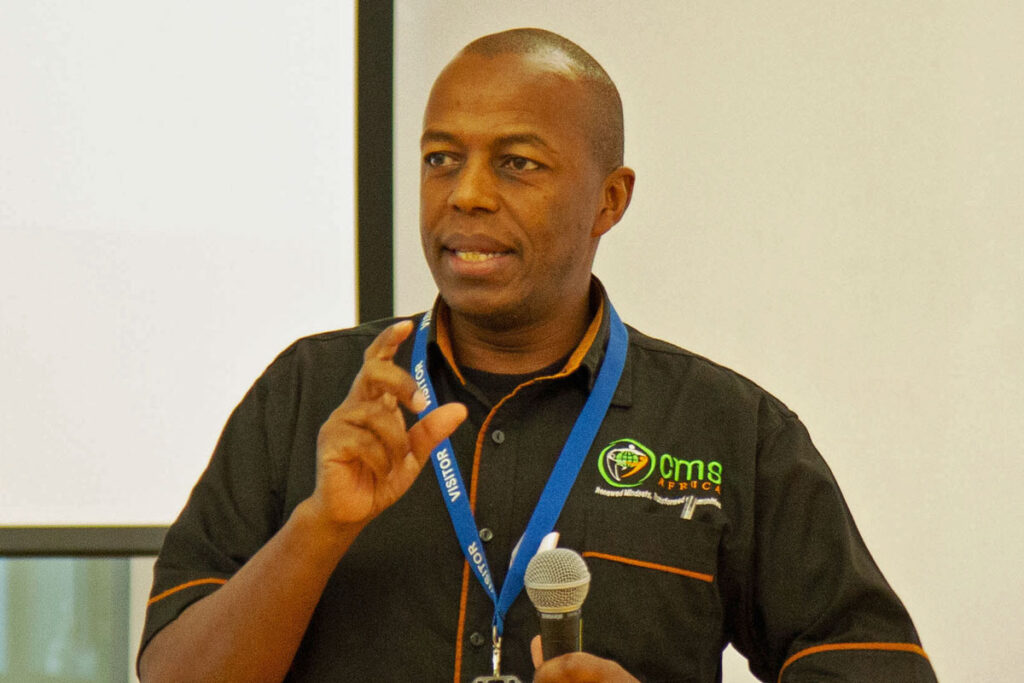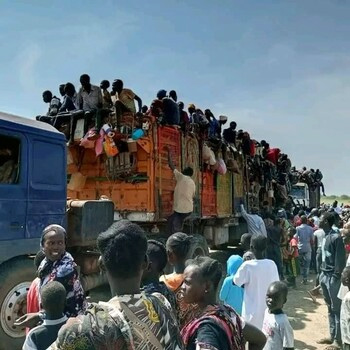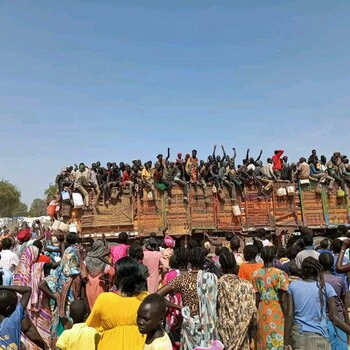“The blood of Christ is thicker than tribal identity”
Karobia Njogu of CMS-Africa tells a remarkable story of steps towards peace
Photo: People in South Sudan continue to suffer from the effects of violent conflict
Amid near-constant reports of brutal violence in South Sudan, Karobia Njogu shares glimmers of hope and “small miracles” happening among two tribes who are working to find peace through Jesus.
Interview with Karobia Njogu, CMS-Africa cross-cultural mission manager by Paul Francis, CMS key relationships manager
Paul: Can you give us a bit of background about the conflict between the Twic and the Ngok peoples?
Karobia: So, I humbly submit this as an admitted outsider from Kenya. South Sudan has been a country in formation. For a long time, there was armed conflict between the government and various rebel groups.
In 2018 a peace agreement was signed and two years later a government of national unity was formed. That sort of reduced a certain kind of violence.

But what emerged was unresolved tribal conflicts between communities in various regions. Sometimes jostling for power but maybe conflicts about resources: land, water, cattle; there’s cattle raiding because people want cattle to pay dowry for their sons to get married, or settling court cases or paying fines.
People pick up guns
What happens is that people pick up guns: AK47s, RPGs. Or they fight with fists. There’s an element of understanding in many circles that this is how you resolve things.
So, the Dinka are one of the largest ethnic groups with various subgroups. The area we are talking about is called Abyei. Two Dinka subgroups bordering each other in this region are the Twic and the Ngok.
The groups used to be on good terms but in recent years they have been in a vicious land dispute.
“People have been so hurt. They wear their losses likes cloaks; they are ever present.”
My understanding is that there used to be a river between the two groups but when it dried up the Ngok started moving to the Twic side, settling down, having families.
But when the government started adjudicating the land after the war, the Twic said the Ngok didn’t belong near them. Official boundaries were left unclear and the seeds of destruction were sown.
What have been the outcomes of this dispute?
To be direct, they have been slaughtering one another. In terrible ways I won’t describe here but I have seen pictures. The Ngok have not been able to safely pass through the Twic area for two years now, which is a key part of this story.
So, how did the two groups end up getting together?
A couple of years ago, CMS and CMS-Africa felt God calling us to focus together on making disciples of Jesus in areas of armed conflict, such as South Sudan.
Focus on peace
Last year we scheduled some training for church leaders in the area on holistic ministry, biblical worldview principles and peacebuilding. Our local partners Paul and Regina Lueth come from the Twic community and were part of the training.


During that time, there were discussions about the Twic–Ngok conflict. Because we have strong partnerships in the area, we thought, we can do something. We thought, what if we bring church leaders from both sides together in Wau for training?
Our training shows people how to identify problems and address these using resources that are already present in the community. This could be a good basis for building peace.
“There is something positive, hopeful, and comforting when Christians hold hands and see each other as brothers and sisters.”
We started planning for this, identifying people to invite. We wanted a mix of church leaders, lay people, men, women and young people.
Things were progressing but there was a big problem – how to get people to Wau safely. Remember, the Ngok couldn’t travel through Twic-controlled territory.
UN support
The UN has a presence in Abyei – the name of the agency is UNISFA (United Nations Interim Security Force for Abyei). Our partner, Bishop Joseph Mamer of Wanyjok Diocese approached them for help.
Amazingly, they agreed to provide safe transport – by helicopter – for the Ngok church leaders.
Two of the UNISFA officials ended up staying through the training. I think they were curious to see what would happen, having witnessed a previous effort by NGOs to get these groups to come together in early 2023 – to no avail.
They told us there was too much animosity and hostility and a complete lack of trust. They couldn’t even stay in the same hotel out of fear of each other; it was a disaster.
And this time?
So, in January, 15 Christian leaders from each community met together in Wau. When the Ngok leaders landed and the representatives from the two groups saw each other, they started hugging and greeting each other warmly. They hadn’t seen each other for a long time due to the conflict.
Brothers and sisters together
It was really heartwarming to see brothers and sisters excited to see each other. It was a lovely beginning to five days of training.
During that week, the group talked and shared meals. They kept taking phone calls from anxious people back home, asking if they were okay, if the other group was causing trouble. And they were able to tell them all was well.
For them, there’s a connection – the blood of Jesus is thicker than tribal identity. There is something positive, hopeful, and comforting when Christians hold hands and see each other as brothers and sisters like Paul says – we are one in Christ.
“There is hope, a belief that something beautiful can come of this, and CMS and CMS-Africa can be part of it.”
The training they leaders went through is Wholistic Transformational Leadership by CMS-Africa and peacebuilding, conflict resolution and mediation which was facilitated by CLIP – the Church Leaders Initiative for Peace. CLIP brings together different church denominations to promote peace in the Bahr El Ghazal region.
Moving forward
At the end of five days the leaders had agreed to work together for peace between the groups. One of the UNISFA officers said that he felt hopeful for the first time in a long time. Then something terrible happened.
What was that?
On the last day, during breakfast, phones started buzzing with reports that there had been a major attack in the Abyei market and dozens of people had been shot and killed, mostly Ngok, including the cousin of one of the leaders present.
There was a heavy spirit in the air. Everything could have easily fallen apart.
But then one of the Ngok leaders said, “We cannot stop this. We have to move forward.”
What are some things the two groups have agreed to do?
At the conclusion of the training, the church leaders from the Twic and the Ngok agreed to do three things:
- Counteracting the negative messages that foster hate and incite conflict filled with lies with positive messages of truth and hope.
- One thing that was identified during the week was the cultural lies that had been spread about each other – often through social media. Negative stereotypes, false reports.
- There are people who try to sow division and foment hostility for their own ends, sometimes political.
- Even some pastors had believed the lies about the other group.
- Work with the various community leaders on each side to facilitate free movement of people and goods between the two communities.
- This is a huge sign of reconciliation taking place when people can participate in exchange.
- Each leader committed to reach out to their local authorities
- to share what they learnt about peace-building and community transformation
- to encourage to support them in their efforts towards peace-building and conflict resolution.
- From there they can bring local people together for community-wide peace events.
The key is people need to keep talking and getting together and church leaders from the various denominations have to keep playing their part.
“God is doing much more than we imagined already, through simple acts of obedient faith.”
Another thing that is sorely needed is trauma healing training for church leaders. This must be managed carefully. People have been so hurt; they wear their losses likes cloaks; they are ever present.
How can a leader minister effectively to someone who has lost property, their children, their spouse, friends to such horrific violence?
How can they allow them to share their grievances without seeking revenge?
Some want to confess their crimes against another, but how can they do so without fear?
We need much wisdom from God.
How will you know if peace is being built?
This is an emerging story, one that we’ll keep tracking. Indicators of success will include more instances of churches bringing people together, children from both sides being able to go to the same school like they used to, market trading together. And more reports of people resolving their problems without resorting to violence.
I did hear recently from Joseph, our country coordinator. He called and said, “Karobia, something is happening.”
He told me that a group of Ngok people recently travelled safely through Twic territory over ground. A bunch of trucks got safely to the other side.
The people will tell you, this was actually a small miracle. It shows what is possible. A bus travelling on a road it couldn’t before. The amount of joy was amazing.
There is hope, a belief that something beautiful can come of this, and CMS and CMS-Africa can be part of it. God is doing much more than we imagined already, through simple acts of obedient faith.